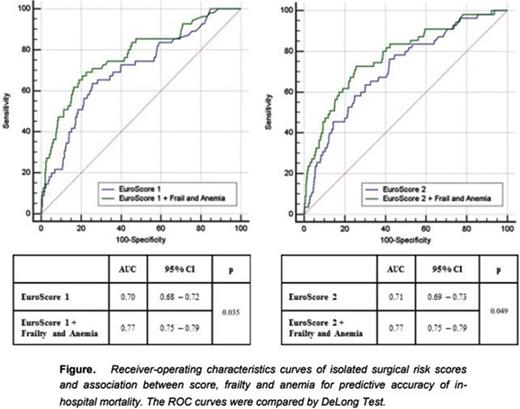-
Views
-
Cite
Cite
A Rosler, G Constantin, P R Nectoux, D Borges, J Fraportti, M R N Pontes, P Dal Lago, F A Lucchese, P4735
Preoperative frailty is a predictor of worse in-hospital outcomes after coronary artery bypass graft surgery and improves the predictive accuracy of EUROSCORE I and II, European Heart Journal, Volume 40, Issue Supplement_1, October 2019, ehz745.1111, https://doi.org/10.1093/eurheartj/ehz745.1111Close - Share Icon Share
Abstract
Although coronary artery bypass grafting (CABG) is the most widely performed cardiovascular procedure in the world and is the standard treatment for complex coronary artery disease, the risk prediction for the procedure has major gaps. In this context, preoperative frailty may have a relevant role in the prediction of surgical risk.
Our goal was to evaluate the impact of frailty on in-hospital outcomes after CABG and verify if any other comorbidity enhances the effects of fragility.
Prospective cohort of patients submitted consecutively to isolated CABG between Jan/2013 and Dec/2017. Frailty was defined as any deficiency in the Katz Index. Of the 1508 patients, 126 (8.4%) were classified as frail. Baseline characteristics and outcomes were compared by univariate analysis. Multivariate regression models were applied for the adjusted analysis of outcomes. The predictive accuracy of the regression models were analyzed using ROC curves. The additional predictive accuracy of the frailty and other risk variables were evaluated by comparing the ROC curves with the DeLong test.
The frail patients presented more advanced age, more comorbidities and the majority were female. Frailty was an independent predictor for in-hospital mortality (OR 5.55, p=0.002) and MACCE (OR 5.60, p=0.001). In addition, by means of an adjusted analysis, we identified that the frailty was associated with a longer time of hospitalization (B 4.61, 95% CI 2.12–7.10, p<0.001). We also identified that preoperative anemia was classified as an independent predictor for hospital mortality and MACCE and improved the effect of frailty on outcomes. In this way, we could verify that when associated with surgical risk scores, frailty and anemia significantly improved the predictive accuracy of EuroScore 1 and EuroScore 2 for in-hospital mortality.

Predictive accuracies
Frailty and preoperative anemia are independent predictors of hospital mortality and MACCE after CABG. Frailty was also a predictor of longer hospitalization time. The association of frailty and anemia with surgical risk scores resulted in a significant improvement in the predictive accuracy of the scores. Frailty screening by Katz Index improved the risk assessment for isolated CABG and, when associated with anemia, demonstrated that frail and anemic patients had worse surgical outcomes.
The development of the present study was funded entirely by the Institution itself.
- anemia
- coronary artery bypass surgery
- coronary arteriosclerosis
- operative risk
- frailty
- cardiovascular surgical procedures
- comorbidity
- frail elderly
- hospital mortality
- preoperative care
- risk assessment
- roc curve
- surgical outcome
- european system for cardiac operative risk evaluation
- univariate analysis
- verification





